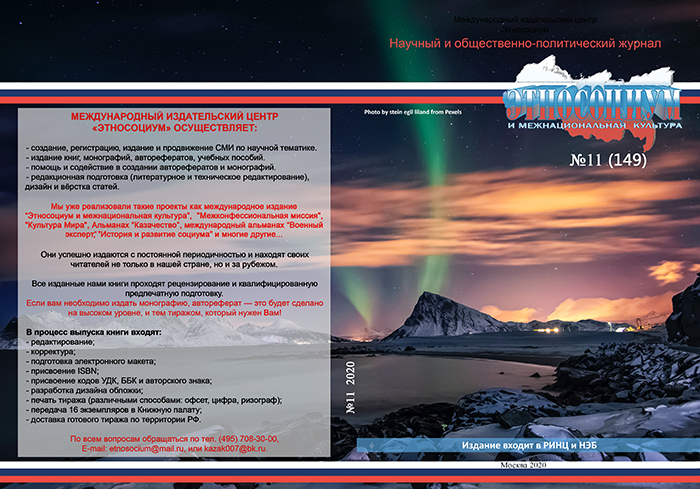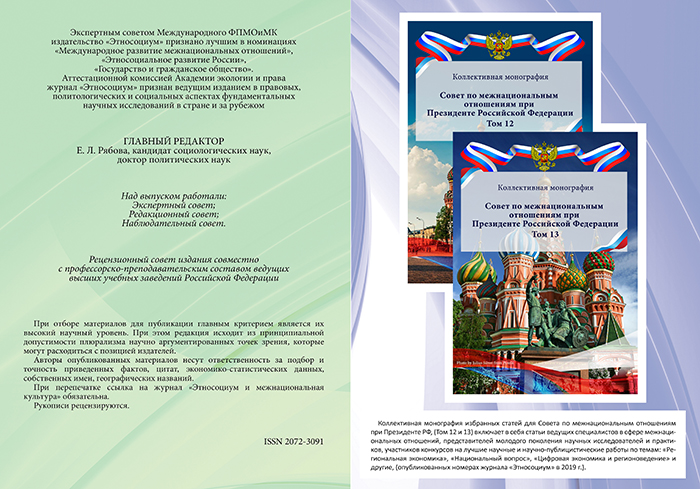

Content
|
COUNCIL OF INTERNATIONAL RELATIONSHIP
|
|
|
Maklashova E.G. Interethnic relations as an indicator of the multi-ethnic community state (case of Yakutia)
|
9
|
|
ACTUAL PROBLEMS OF MODERN SOCIETY
|
|
|
Gribanova G.I., Yudin V.I. Virtual communities in modern ethnopolitics (on the example of the Sami people)
|
19
|
|
REGIONAL STUDY
|
|
|
Budarin P.V. Radicalization as a trend of modern protest activity in the post-Soviet space
|
31
|
|
INTERNATIONAL RELATIONSHIPS
|
|
|
Kazanin M.V., Abdrakhimov L.G. The concept of the PLA logistical support: the basic approaches and directions of implementation
|
37
|
|
Fabio Coacci On the compatibility of human rights with the values of non-western cultures
|
50
|
|
Polonchuk R.A. Main external challenges and threats to the Russian Federation in the Asia-Pacific region
|
57
|
|
Basak A.E. Cuban Humanitarian Policy as an Instrument of Foreign Policy and international positioning
|
67
|
|
Zhou Yanyan Sino-Russian humanitarian exchanges and cooperation in the 21st century
|
79
|
|
SOCIOLOGICAL SCIENCES
|
|
|
Bakharev V.V., Pashkevich A.V., Safonov K.B. Social capital of the organization: concept and analytical variables
|
90
|
|
CONFERENCE
|
|
|
Nahideh Kalashi State and prospects of scientific and educational cooperation between Iran and Russia
|
99
|
|
Komleva V.V. Caspian region - potential of youth scientific cooperation
|
104
|
|
Abstracts
|
111
|
|
Authors
|
120
|
|
Requirements to materials submitted to the international publishing house "Etnosocium"
|
123
|
This article presents the results of the analysis of changes in the public assessment of interethnic relations in Yakutia. Based on the study of the situation in the sphere of interethnic relations, a parallel with the social well-being of groups with different positions in the multiethnic space is drawn. It is indicated that the assessment of interethnic relations is a universal indicator of the multiethnic community state. It is concluded that there is a positive trend among Yakuts and Russians in assessing the sphere of interethnic relations at different levels of communication. It also concludes that today the republican authorities have resources to strengthen interethnic solidarity in a multiethnic community, but their analysis requires constant monitoring of public opinion in the ethnic context.
Keywords: interethnic relations, social well-being, multi-ethnic community, monitoring, Russians, Yakuts, the Republic of Sakha (Yakutia).
The role of virtual communities in the sphere of ethnopolitics is constantly growing. Internet groups based on shared ethnic identity that in their perception is under threat are becoming more and more active both on national and international levels. The article analyses how Sami people being an indige¬nous community divided between four different countries use Internet in order to preserve their ethnic and cultural heritage, to save and distribute their languages and to form a basis for lobbing political authorities in Nordic countries and Russia. By combining online and offline political activity Sami have managed to find their own unique place in the modern world serving as an inspirational exam¬ple for other indigenous people.
Keywords: virtual ethnic community, Sami. Internet, websites, social network.
The USSR, as one of the great powers of the world, collapsed more than 25 years ago, today its former territory is called the post-Soviet, this concept appeared almost immediately after the collapse of the USSR. Radicalization is a process in which individuals or groups of people become followers of religious, political or other types of extremism. everyone can be radicalized under certain conditions, it does not depend on a particular nationality or religion, but rather political and socio-economic factors, as well as internal motivation. In the article, the author considers radicalization as a trend of modern protest activity in the post-Soviet space, the reasons for its rise, factors in the development of the process and modern protest events.
Keywords: radicalization, nationalism, extremism, Pro-Western attitude, politics, post-Soviet space.
The analysis of the implementation of the conceptual requirements of the military-political leadership of the PRC to the PLA logistics support system in this article is carried out. The directions of implementation of the principle of military-civil cooperation are revealed. The tasks of the PLA Joint Logistics Service, its structure and functioning features are presented.
Keywords: PLA, military-political leadership, logistic support, military-civil cooperation, military property, support bases.
Notwithstanding human rights is a concept which sinks its roots in the western political and philosophical tradition, the values which underlies human rights may be traceable in different cultures. This article seeks to probe the potential global acceptance of the concept of human rights providing a sketch on the level of compatibility of human rights with the Asian values, the African tradition and the Islamic culture. Therefore, the article makes use of a comparative approach to analysis non-western philosophical cum political standing on human rights vis-à-vis the consolidated conception of human rights. The findings underline that, even though relevant reasons of conflict between non-western values and human rights persist, there are also margins of compatibility between them which would partially disprove the widespread presumption that human rights cannot definitely be compatible with the values of non-western cultures.
Keywords: human rights, Asian Values, Islamic Culture, African rights, declarations, conventions, interculturalism.
The article examines the main external challenges and threats of the Russian Federation in the Asia-Pacific region. Based on the analysis of domestic and foreign sources, factors that can lead to the destabilization of the military-political situation in the APR are considered. The main alliances of states that form the potential for conflict in the APR are identified.
Keywords: China, USA, Asia-Pacific region, challenge, national security, Japan, South Korea.
The single-case study of the Cuban humanitarian policy – provision of medical services – serves as an illustration of a small nation’s effective positioning in the international arena. The study forms knowledge on the soft-power potential of small powers at the present stage of international relations development. The study is especially interesting in the context of the active Russian humanitarian work used to spread national influence in other regions.
Keywords: humanitarian policy, Cuba, small nations.
Humanitarian exchanges between the PRC and foreign countries are an important part of the foreign policy of the Chinese Communist Party and the People's Republic of China, a significant factor in promoting the development of bilateral and multilateral relations. Humanitarian exchanges and cooperation between the PRC and the Russian Federation are important in the development of their bilateral relations. This work is devoted to the study of the development process and the characteristics of the Chinese-Russian humanitarian exchanges and cooperation in the 21st century.
Based on the history of Sino-Russian relations of the last decades, this article analyzes the relevant treaties, joint communiqués and agreements concluded in the humanitarian sphere, summarizes the achievements and describes the humanitarian exchanges and cooperation between the PRC and the Russian Federation at various stages from the beginning of the 21st century to the present day.
Keywords: Sino-Russian relations, humanitarian exchanges, humanitarian cooperation, XXI century.
The article considers the social essence of an organization as a specific system, which is revealed through its subjectivity, social and individual-personal determination, social interaction, contact with the environment, the unity of organizational and non-organizational in the behavior of personnel. Attention is also focused on the leading role of a person in organizational relations, the variety of social functions of an organization, the unity of economic and social factors of its development, social regulation (self-regulation).
Keywords: organization, social organization, social system, organizational functions, self-regulation.
The article is dedicated to the examination of the state and development of the Iranian-Russian educational cooperation, which is considered one of the important foundations in the development of relations between the two countries. In recent years, thanks to the atmosphere of mutual understanding and trust in relations, cooperation in the scientific and educational sphere has been intensively developing and strengthening the foundation for realizing the interests of the two countries and the internationalization of education.
Keywords: Iran, Russia, scientific and educational cooperation, internationalization of education and science.
The article deals with the special significance, for peace and harmony, of the Caspian region for youth scientific cooperation.
Keywords: Caspian region, cooperation, youth, peace, science.